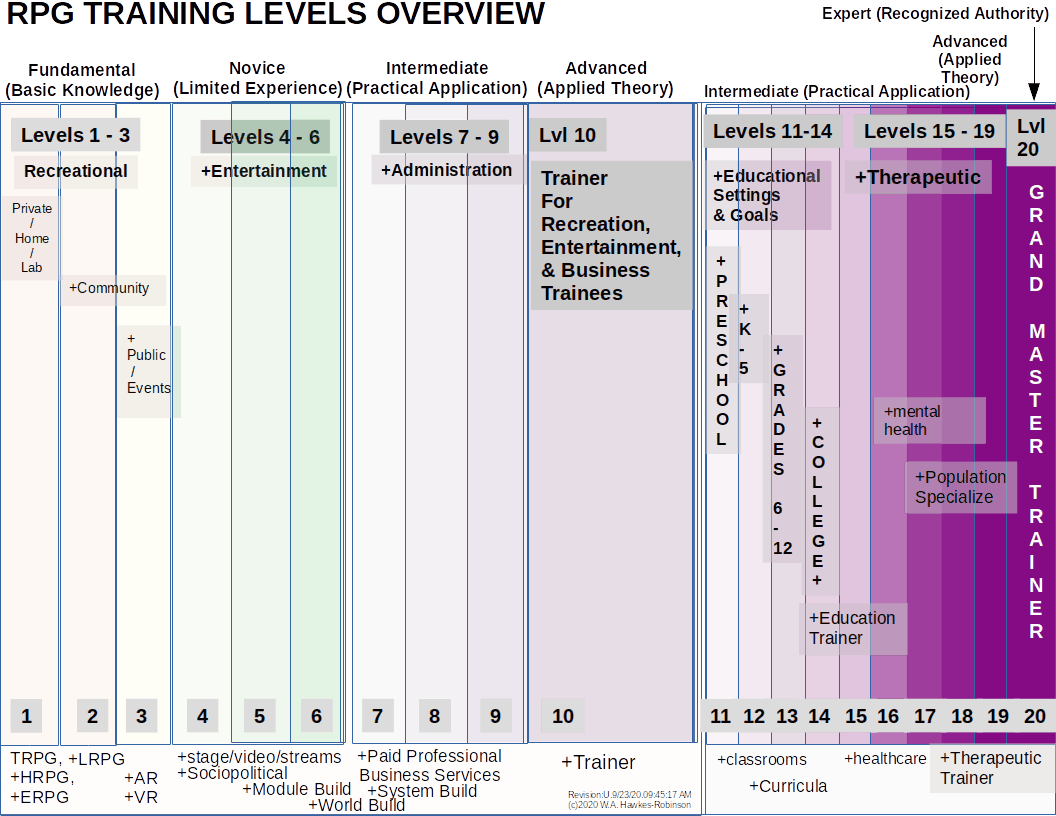RPG Player/GM Learning Levels Page
Volunteer Trainee Checklists
-
RPG Player / GM Trainee Level 1 Volunteer Training Checklist Page (16 week program).
-
RPG Player / GM Trainee Level 2 Volunteer Training Checklist Page (pending updates converting from 12 week to 16 week program).
-
RPG Player / GM Trainee Level 3 Volunteer Training Checklist Page (pending updates converting from 12 week to 16 week program).
-
RPG Player / GM Trainee Level 4 Volunteer Training Checklist Page (pending updates converting from 12 week to 16 week program).
-
RPG Player / GM Trainee Level 5 Volunteer Training Checklist Page (pending updates converting from 12 week to 16 week program).
-
RPG Player / GM Trainee Level 6 Volunteer Training Checklist Page (pending updates converting from 12 week to 16 week program).
-
RPG Player / GM Trainee Level 7 Volunteer Training Checklist Page (pending updates converting from 12 week to 16 week program).
-
RPG Player / GM Trainee Level 8 Volunteer Training Checklist Page (pending updates converting from 12 week to 16 week program).
-
RPG Player / GM Trainee Level 9 Volunteer Training Checklist Page (pending updates converting from 12 week to 16 week program).
-
RPG Player / GM Trainee Level 10 Volunteer Training Checklist Page (pending updates converting from 12 week to 16 week program).
<additional training level checklists coming soon!>
We freely currently offer 5 different pathways and 20 training levels and various specializations for our volunteer trainees.
If you are looking for more intensive workshops or specialization workshops, check out the for-profit organization RPG.LLC for such options.
Training Pathways
We have found over the years 5 major groups of trainees interested in what we do and wanting to help or bring RPGs into their own lives in one way or another. There is a huge range of variation overall, but over time we have found these 5 pathways cover the bases fairly well (of course if you think of a pathway that doesn't fit, please let us know so we can adjust accordingly):
-
Laypersons, standard recreational non-professional use of role-playing games.
-
Recreational professionals
-
Entertainment professionals
-
Educational professionals
-
Therapeutic/medical/healthcare professionals
Volunteer Roles
RPG Research exists thanks to our 100% volunteer run model. No one at RPG Research is paid. We are trying to implement (and it appears to be working) a human version of the peer-to-peer networking model seen with projects like Distributed.net and similar.
We have a huge range of Volunteer Roles that always need filling (see the list to sign up and help).
For this page, we'll just focus on the RPG-related roles.
RPG-Related Training Roles
-
Electronic RPG Developer (included our brain-computer-interface ERPG project)
The Most Well-Rounded Approach: Training Levels
There are lots of workshops out there to help get bits and pieces, and various jumpstarts for people wanting to learn more about RPGs.
However, if you want a truly well-rounded and comprehensive training in role-playing games for all formats, consider our training levels approach. Of course this is a long-term commitment, but something you can pick up and set down as life permits.
Years ago we started with just 4 training levels, each level taking years to complete. However for most people this didn't provide the incremental rewards and reinforcements most people need to stick through long-term challenges, so we struggled to get people to the higher levels.
We later expanded to 7 levels based on what we now call pathways, but that was till too much information.
Still later we expanded to 10 levels in each pathway, trying to break the pieces into smaller and more manageable pieces, and saw significant improvement, but we're still trying to improve the design and implementation (always).
Last year we broke the programs up into 20 distinctive levels, with pathways therein. It still isn't perfect, and we are still trying to optimize trying to share so much information (40+ years of experiences and research) in as effective and accessible a means possible. We clearly still have a long way to go, but feedback is enthusiastic that we are on the right track.
Levels one through 3 we set the goal of trying to include the baseline training that can be covered in 16 weeks (4 hour training sessions once per week, plus weekly assignments) with a depth appropriate to this beginners level. We tried to make it work in 12 week segments, but kept ending up with some weeks too large, so this further segmenting into 16 weeks is making for a more consistent learning experience and cognitive load each week. Most of our documentation is still referencing our 12 week programs, so please be patient as we continue this conversion to the 16 week programs.
All of our training sessions include:
-
Baseline topics of the week quiz
-
Administration topics
-
Applied gaming
-
Lecture/discussion
-
Tips/tricks of the trade
-
More applied gaming
-
Regular physical breaks each hour (very important)
-
Quiz re-take on the topics-of-the-week
-
TR quiz (for CTRS-interested trainees)
-
Optional online self-study & quizzes
-
Weekly practicum/assignments
All volunteer trainees are expected to attend one training session per week (they are welcomed to attend as many as they want of course), and "give back" to the community at least twice per month.
"Giving back to the community" means either helping RPG Research directly in their relevant volunteer role, or in their local community when they are ready (we'll gladly coach/guide them) to setup a community program in their region of the globe.
We have volunteers with us now for many yearsvthanks to this flexible (and free) volunteer trainee approach and flexible schedule, which is slowly helping us expand our capabilities and capacity to help others.
Starting From Scratch?
If you are wanting to start training from scratch with zero-or-little prior RPG experience, and interested in learning along one of the 5 pathways (layperson, recreational professional, entertainment professional, educational professional, or therapeutic professional), and have the time and resources, following this approach for "levels" of training will provide the most well-rounded professionals that really want to Subject Matter Experts (SME)s on the topic of role-playing games and their best applications.
Proficiency Scale (NIH inspired)
Categorizing the training levels grouped according to the National Institute of Health's (NIH) Proficiency Scale is illustrated in the diagrams below.
Source: https://hr.nih.gov/working-nih/competencies/competencies-proficiency-scale
They are rated on a scale of 1 through 5:
1. Fundamental Awareness (basic knowledge).
-
Focus is on learning.
-
Common knowledge or understanding of the basic techniques and concepts.
2. Novice (limited experience).
-
Focus on developing through on-the-job experience;
-
Level of experience gained in a classroom and/or experimental scenarios or as a trainee on-the-job. Expected to need help when performing this skill.
-
Understand and can discuss terminology, concepts, principles and issues related to this competency;
-
Utilize the full range of reference and resource materials in this competency.
3. Intermediate (practical application).
Able to successfully complete tasks in this competency as requested. Help from an expert may be required from time to time, but you can usually perform the skill independently.
-
Focus is on applying and enhancing knowledge or skill;
-
Have applied this competency to situations occasionally while needing minimal guidance to perform successfully;
-
Understand and can discuss the application and implications of changes to processes, policies, and procedures in this area.
4. Advanced (applied theory).
You can perform the actions associated with this skill without assistance. You are certainly recognized within your immediate organization as "a person to ask" when difficult questions arise regarding this skill.
-
Focus is on broad organizational/professional issues;
-
Have consistently provided practical/relevant ideas and perspectives on process or practice improvements which may easily be implemented;
-
Capable of coaching others in the application of this competency by translating complex nuances relating to this competency into easy to understand terms;
-
Participate in senior level discussions regarding this competency;
-
Assist in the development of reference and resource materials in this competency.
5. Expert (recognized authority)
Known as an expert in this area. You can provide guidance, troubleshoot and answer questions related to this area of expertise and the field where the skill is used.
-
Focus is strategic;
-
Demonstrated consistent excellence in applying this competency across multiple projects and/or organizations;
-
Considered the “go to” person in this area within NIH and/or outside organizations;
-
Create new applications for and/or lead the development of reference and resource materials for this competency;
-
Able to diagram or explain the relevant process elements and issues in relation to organizational issues and trends in sufficient detail during discussions and presentations, to foster a greater understanding among internal and external colleagues and constituents.
Summary Diagrams of Pathways & Learning Levels
Note that this is a grossly oversimplified summary, and that all 5 proficiency levels may be achieved in some areas withing a single RPG Professional training level. But these diagrams should help people gain some sense of the relative expertise in the progression overall.
Of course all 5 (or 6 if you include not applicable "0" level) levels of proficiency can be applied to every single topic included in every level. This is just a rough guide we hope is conceptually helpful for general understanding by those new to these ideas.
Fundamental (Basic Knowledge)
Beginning Laypersons & All Beginning Professionals (levels 1-3)
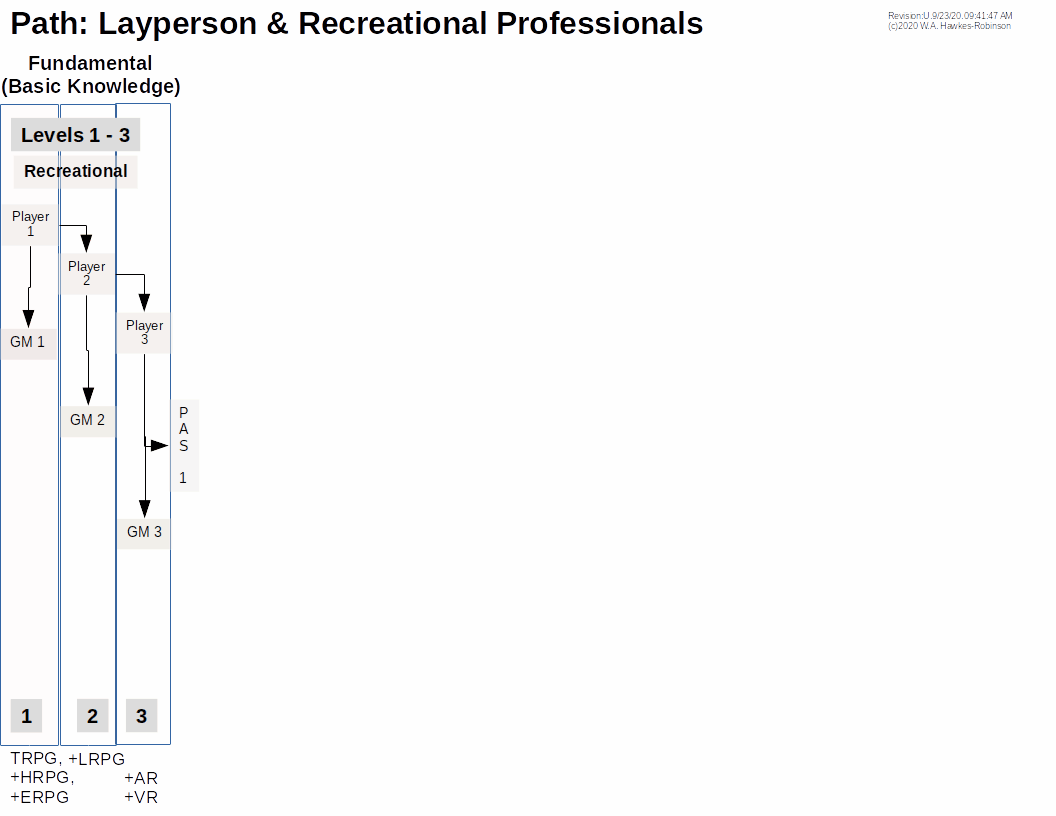
Novice (Limited Experience)
Intermediate Laypersons, & Novice Recreational & Entertainment professionals (levels 4-6).
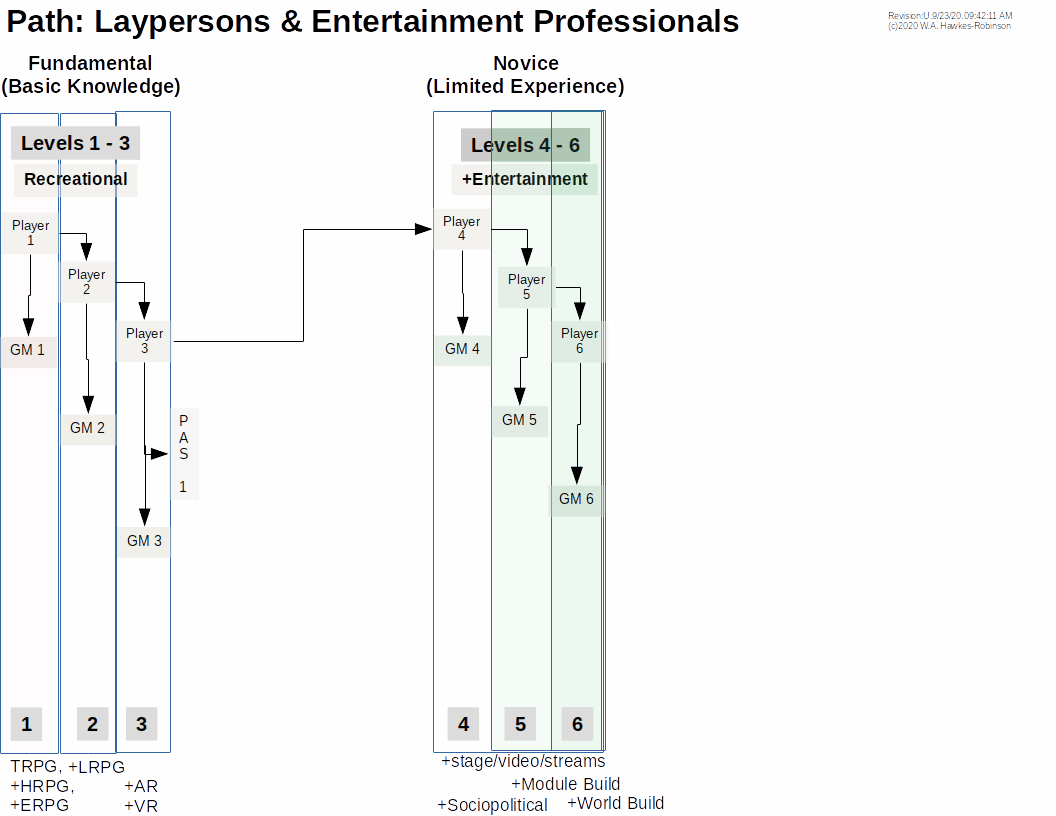
Intermediate (Practical Application & Theory)
RPG businesses for Recreational & Entertainment Professionals (levels 7-9)
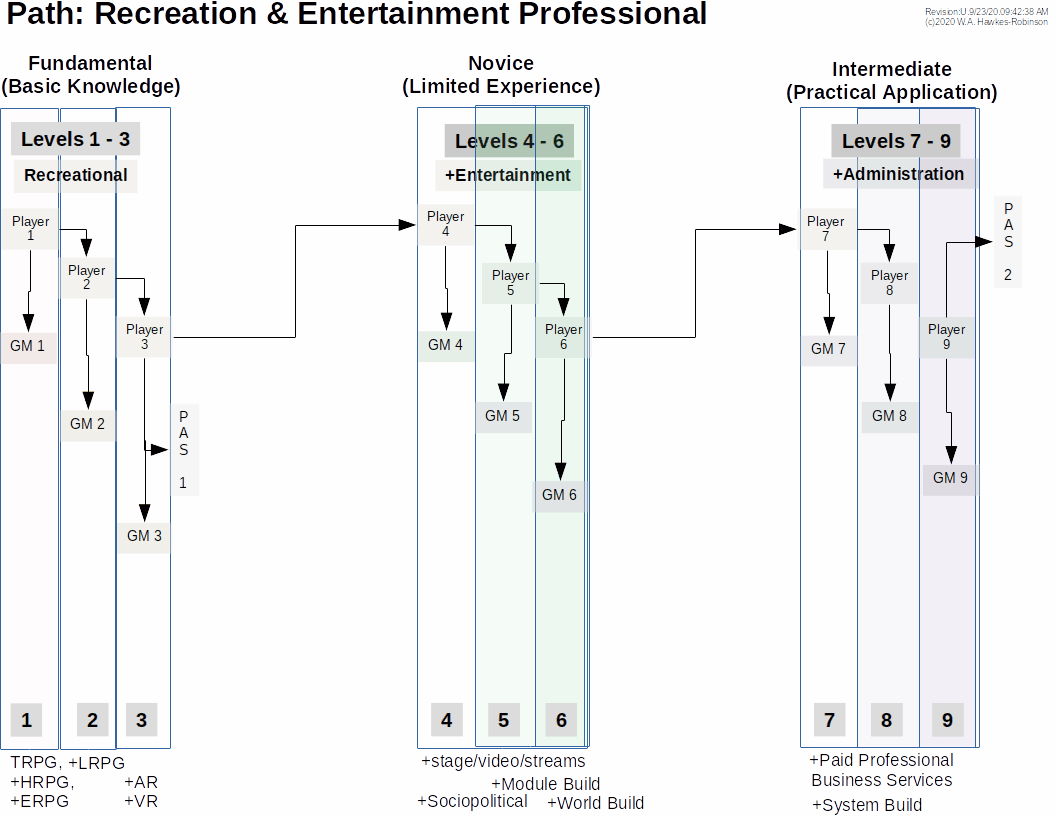
Expert (Recognized Authority)
Trainer for Laypersons as well as Recreational & Entertainment Professionals (level 10)
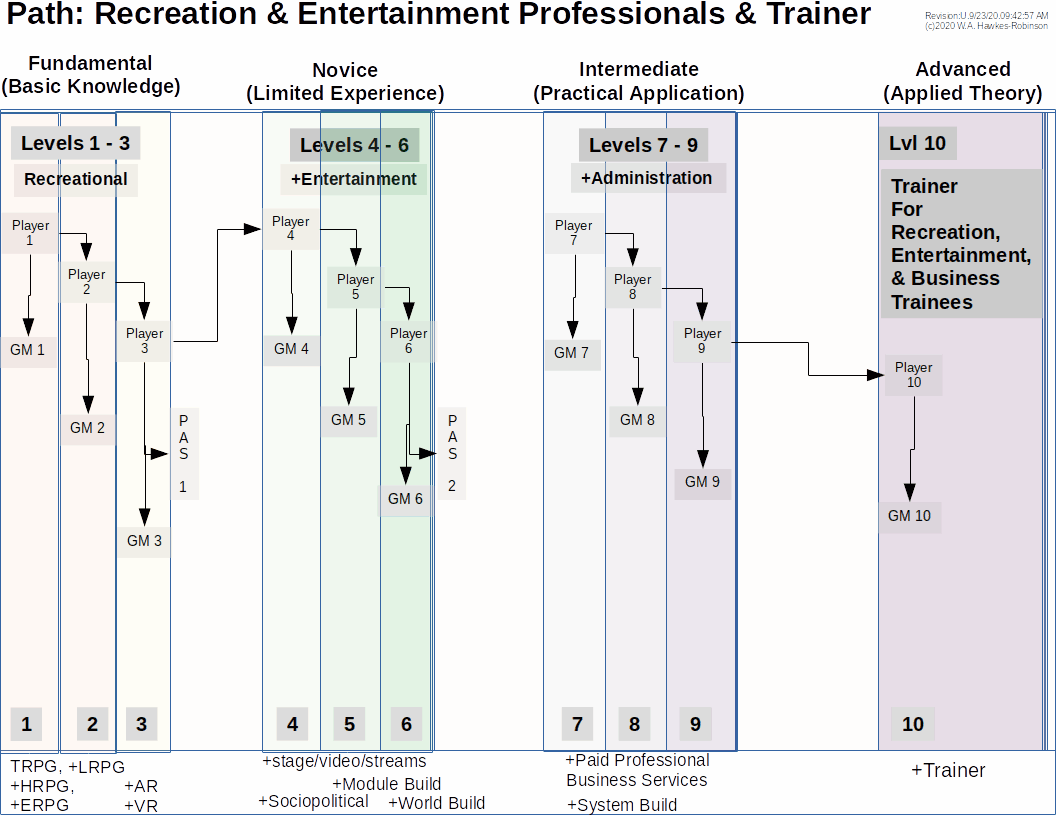
Advanced (Applied Theory)
Training for Educational Professionals (levels 11-13)
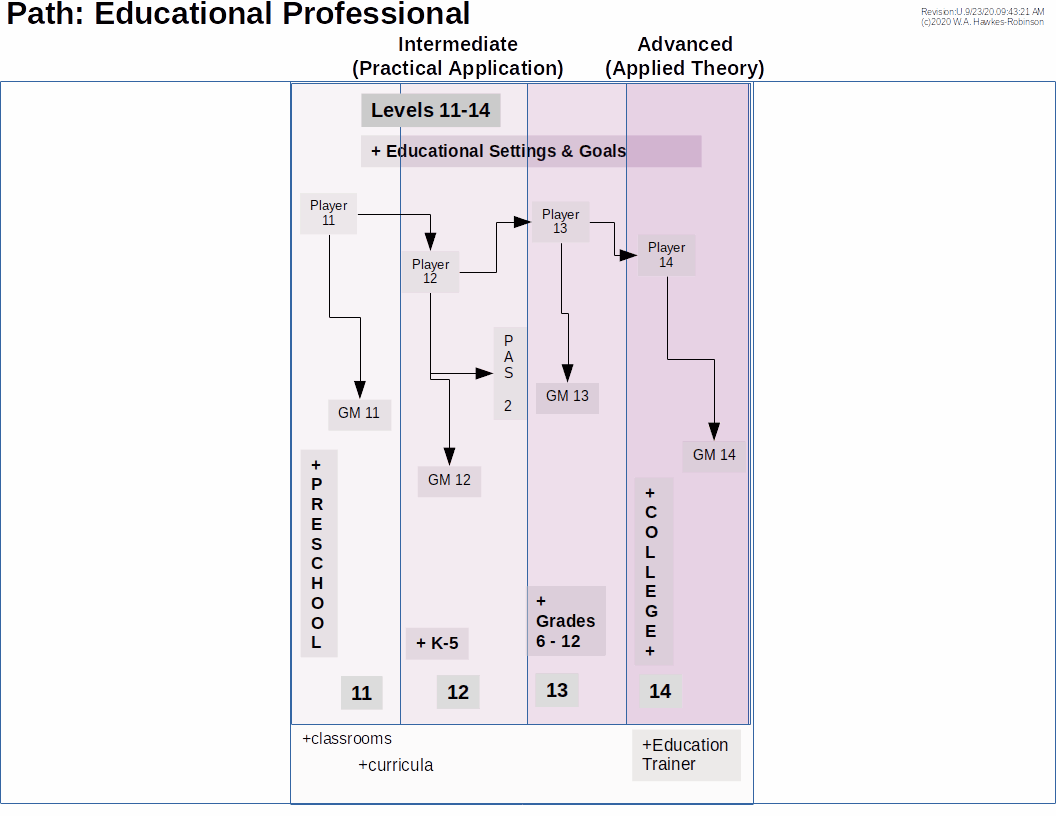
Advanced (Applied Theory)
Training for Therapeutic Professionals (levels 15-18).
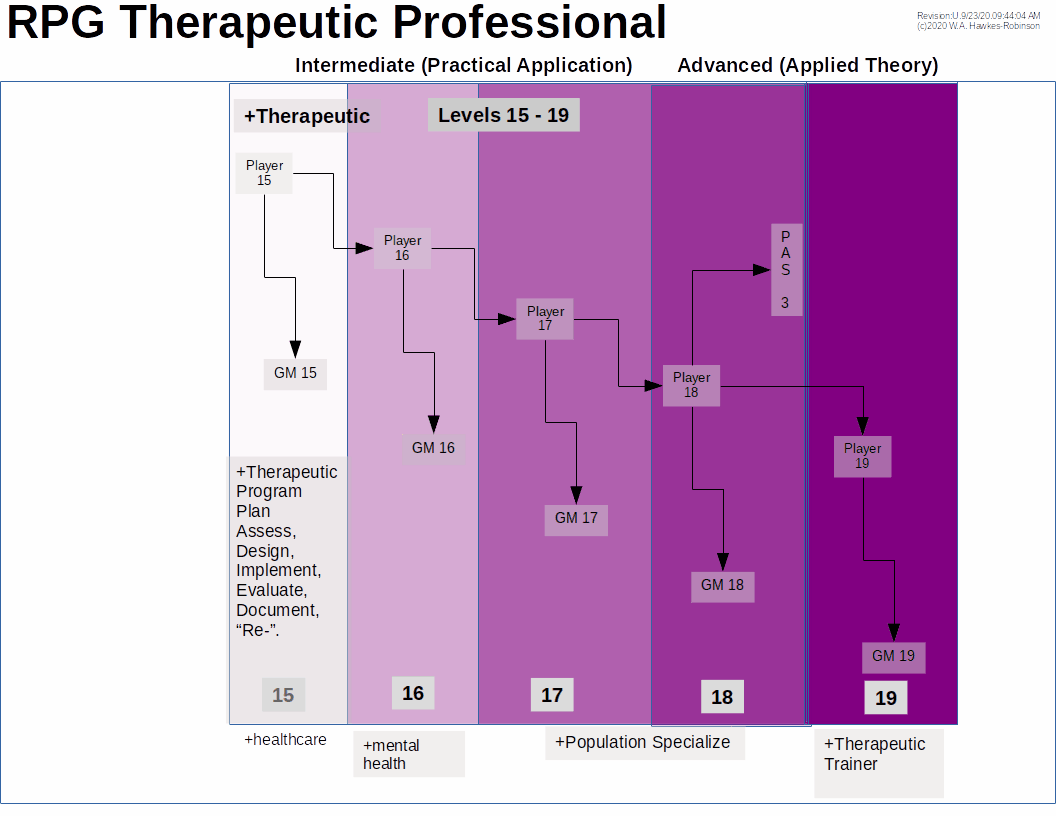
Expert (Recognized Authority)
Trainer for all Professionals (level 20).
